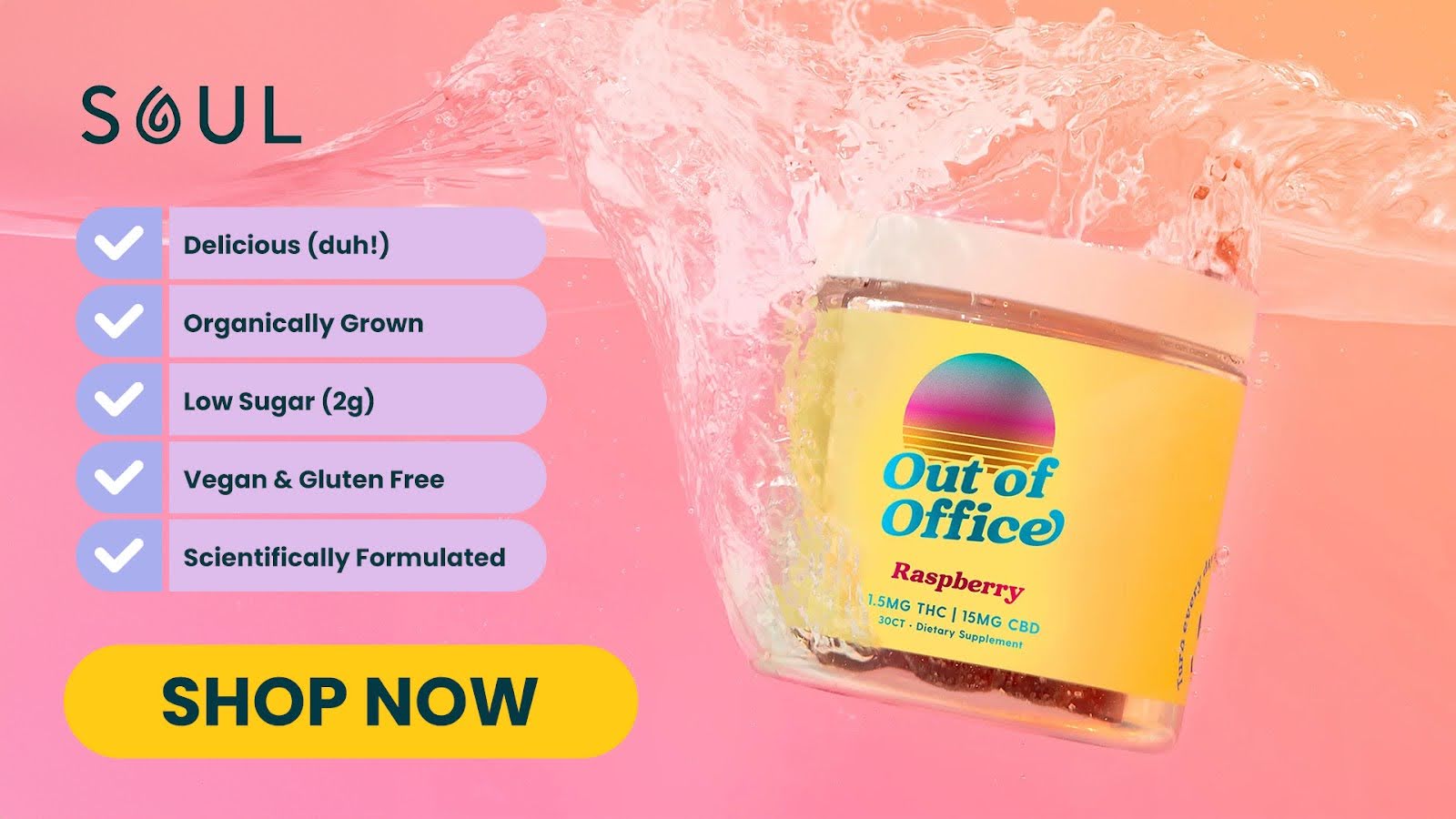
Key Takeaways:
- Medical vs. Recreational Use: West Virginia allows THC for medical use under strict regulations, while recreational use remains illegal.
- Legal Risks and Penalties: Possession of THC without proper medical authorization can lead to severe penalties, including fines and imprisonment.
- Future Legal Changes: The laws for THC in West Virginia may change, influenced by national legalization trends and public opinion.
At Soul, we are committed to adhering to West Virginia's regulations on THC content in all of our products. We ensure that each item we offer contains less than 0.3% THC, strictly following both state and federal guidelines. Our commitment to upholding these legal standards highlights our dependability and reinforces our leading position in the wellness sector. By providing our customers with safe, high-quality, and legally approved products, we build trust and authority within the wellness community.
In this article, we will explore THC’s legalities in West Virginia. We'll look into the distinctions between medical and recreational use of THC, examine the current laws, discuss the penalties associated with THC possession, and consider how federal laws impact state regulations. Additionally, we'll look at legal alternatives to THC and what the future may hold for THC legislation in the state. This comprehensive overview aims to provide West Virginians and others with crucial information about the current status and potential future changes in THC legality.
Understanding The Difference Between Medical And Recreational Use
It's important to understand the legal implications of cannabis in West Virginia, especially when it comes to the difference between medical and recreational use of THC. In this state, patients with certain qualifying conditions can use medical hemp under the medical cannabis program. These conditions include cancer, HIV/AIDS, Parkinson's disease, and chronic pain, among others. Patients must be registered with the state and obtain a medical hemp card.
On the other hand, recreational use of THC is currently prohibited in West Virginia. Possession, sale, or use of hemp for non-medical purposes is illegal and subject to penalties under state law.
Current Laws Governing THC In West Virginia
Medical Cannabis Act
Enacted in 2017, West Virginia's Medical Cannabis Act legalized the medical use of hemp but with specific consumption methods and restrictions. Patients are allowed to use medical cannabis in forms such as pills, oils, topical applications, tinctures, liquids, and dermal patches. Notably, the act explicitly prohibits the smoking of hemp and the home cultivation of cannabis plants, reflecting the state's cautious stance on the potential for abuse.
Licensing And Regulation
To ensure that medical hemp is safely and effectively distributed, West Virginia has put in place a stringent licensing system. This system oversees growers, processors, and dispensaries, requiring them to meet high safety and operational standards. The state's Bureau for Public Health is responsible for overseeing compliance with state regulations and ensuring consistent monitoring and testing of product quality and safety.
Qualifying For Medical Use
Access to medical hemp is tightly regulated. To obtain medical hemp, a patient must be certified by a physician who is registered with the state’s medical hemp program. This process includes thorough documentation and regular follow-ups, emphasizing the program's focus on legitimate medical needs rather than recreational use.
Penalties For THC Possession In West Virginia
Simple Possession
In West Virginia, the possession of a small amount of hemp (less than 15 grams) for personal use is classified as a misdemeanor. Offenders may face fines up to $1,000 and/or imprisonment for up to six months. First-time offenders might be eligible for alternative sentencing options such as drug education programs or community service.
Possession With Intent To Distribute
Possession of larger quantities of hemp or evidence suggesting an intent to distribute (such as possession of scales or baggies) is treated much more harshly, and classified as a felony. This offense can result in a prison sentence ranging from 1 to 5 years and fines potentially exceeding $15,000, depending on the amount of THC and the circumstances of the arrest.
Subsequent Offenses
Individuals with prior drug convictions face escalated penalties if caught possessing THC again. These penalties include longer jail times, higher fines, and sometimes mandatory minimum sentences. Each subsequent offense typically increases the severity of the punishment as part of the state’s efforts to deter chronic offenders.
Paraphernalia
The possession of drug paraphernalia, which includes items intended for use in growing, harvesting, processing, selling, storing, or consuming hemp, is also illegal. This includes everyday items repurposed for drug use, which are often penalized just as strictly as the drugs themselves. Penalties for paraphernalia possession are similar to those for hemp possession and can include fines and up to six months in jail.
Impact Of Federal Laws On West Virginia's THC Regulations
The interplay between federal and state regulations significantly affects the enforcement and application of THC laws in West Virginia. Here's a detailed look at how federal policies impact state-level THC legislation:
- Controlled Substances Act: Despite medical legalization at the state level, THC remains classified as a Schedule I substance under the federal Controlled Substances Act. This classification denotes it as having a high potential for abuse, no accepted medical use in treatment in the United States, and a lack of accepted safety for use under medical supervision. Consequently, federal law prohibits the possession, sale, or use of THC, creating a complex legal scenario for residents and state authorities.
- Federal Enforcement Policies: Historically, federal agencies have exercised discretion in enforcing hemp laws in states where it is legal under state law. However, this discretion is subject to change with different administrations and is not a guaranteed safeguard against federal intervention. This poses a risk for businesses and individuals involved in the state-legal cannabis industry, as they could potentially face federal legal challenges.
- Banking and Commerce: The federal prohibition of hemp affects the ability of cannabis businesses in West Virginia to use banking services. Many cannabis businesses operate on a cash-only basis, increasing risks related to security and financial transparency. Furthermore, the interstate commerce of cannabis is illegal, limiting the market for West Virginia producers strictly to within state borders.
- Impact on Medical Use Programs: Federal restrictions also complicate the operation of medical hemp programs. Research on cannabis is heavily restricted, impacting the development of new treatments and the depth of understanding among medical professionals. Additionally, patients and providers in the medical hemp program must navigate these conflicting laws, which can deter participation and limit access to treatment.
These federal-state conflicts create ongoing challenges for the implementation and expansion of THC regulations in West Virginia, influencing everything from legal enforcement to economic activities within the cannabis industry.
Legal Alternatives To THC In West Virginia
CBD Products
Cannabidiol (CBD) is a non-psychoactive compound found in cannabis that has gained popularity due to its potential health benefits without inducing a high. In West Virginia, CBD derived from hemp (containing less than 0.3% THC) is legal and available in various forms such as oils, creams, and edibles. These products are widely used for anxiety, pain relief, and other medical conditions and are federally legal under the Farm Bill of 2018.
Delta-8 THC
Another alternative is Delta-8 THC, a cannabinoid similar to THC but with milder psychoactive effects. While not as potent as Delta-9 THC (the primary psychoactive component in cannabis), Delta-8 offers many of the same benefits and is in a legal gray area. It is synthesized from CBD and is technically legal at the federal level if derived from hemp, though state laws vary and could impose their own restrictions.
Kratom
Though not a cannabinoid, kratom is another substance used by some in West Virginia as an alternative for pain management and opioid withdrawal relief. Kratom acts on opioid receptors in the brain, but it is not an opioid itself. Its legal status is subject to state regulations, and it remains legal in West Virginia, although it faces scrutiny and potential regulation.
Synthetic Cannabinoids
Synthetic cannabinoids are chemicals designed to mimic the effects of THC and are available in some legal formulations. However, these substances often come with significant health risks and varying legal statuses. Users should exercise caution and be aware of potential harmful side effects and legal issues.
Future Outlook On THC Legislation In West Virginia
Potential For Recreational Legalization
As national trends move toward the legalization of recreational hemp, West Virginia could follow suit. The shift in public opinion might influence state legislators to propose new laws. These laws could establish a regulated market for recreational cannabis, opening new economic avenues through taxation and job creation while also addressing issues of legal justice.
Expansion Of Medical Hemp Program
There is a strong potential for the expansion of the existing medical hemp program in West Virginia. This expansion could include adding more qualifying medical conditions, allowing new forms of THC consumption, and increasing the number of licensed dispensaries. Such changes would make medical cannabis more accessible to a broader range of patients, potentially improving public health outcomes and patient satisfaction with the program.
Legislative Reforms
Ongoing challenges in implementing the current THC regulations might drive legislative reforms to simplify the legal framework. These reforms could focus on enhancing the operational efficiency of cannabis businesses, improving consumer safety, and aligning state laws more closely with potential federal changes. Additionally, reforms may look to strengthen the economic benefits of the cannabis industry within the state by facilitating banking, insurance, and other financial services.
Impact Of Federal Changes
Any changes at the federal level regarding the legal status of hemp could dramatically alter the state's approach. If cannabis were to be reclassified or decriminalized nationally, it would alleviate many of the conflicts between state and federal laws, easing regulatory burdens on businesses and potentially boosting research into cannabis's medical benefits.
Public Health And Safety Initiatives
West Virginia may increase its focus on public health and safety regarding cannabis use due to changing regulations. Initiatives could include targeted educational programs to inform the public about safe cannabis use, increased funding for research into its effects, and policies designed to prevent impaired driving and underage consumption.
Final Thoughts
As West Virginia navigates THC legislation, residents need to stay informed about the current laws and potential changes. Understanding the distinction between medical and recreational use, adhering to the existing legal framework, and recognizing the penalties for non-compliance are crucial for legal and safe cannabis use within the state.
Residents should also be aware of the ongoing debates and legislative efforts that could reshape the future of cannabis in West Virginia. Changes at the federal level could further influence state policies, potentially easing some of the current restrictions and opening new opportunities for both medical and recreational use. Engaging in these conversations, whether through public forums, voting, or contacting local representatives, is important for shaping a policy that reflects the values and needs of West Virginians.
Finally, considering the legal alternatives to THC and understanding their potential benefits and risks is vital. As the state continues to explore these options, consumers need to remain cautious, informed, and compliant with the law to navigate these changes safely and responsibly.
Read also:
Frequently Asked Questions About THC Legality In West Virginia
Can you grow your own hemp for medical purposes in West Virginia?
No, home cultivation of hemp for medical purposes is not allowed in West Virginia.
Are there any legal dispensaries in West Virginia?
Yes, there are legal dispensaries in West Virginia, but they are strictly regulated and must comply with state laws.
What forms of medical hemp are allowed in West Virginia?
West Virginia permits medical hemp in forms such as pills, oils, topical applications, tinctures, liquids, and dermal patches.
Is CBD oil legal in West Virginia?
Yes, CBD oil is legal in West Virginia as long as it contains less than 0.3% THC.
Is it legal to use hemp for anxiety in West Virginia?
Hemp for anxiety is not explicitly listed as a qualifying condition under West Virginia's medical hemp program unless categorized under a broader symptom such as PTSD.
What is the penalty for driving under the influence of hemp in West Virginia?
Driving under the influence of hemp is illegal in West Virginia and can result in DUI charges, fines, and possible jail time.
Can you be fired for using medical hemp in West Virginia?
Yes, employers in West Virginia can enforce drug-free workplace policies and terminate employment for hemp use, even if it's for medical reasons.
Do West Virginia dispensaries accept out-of-state medical hemp cards?
No, West Virginia dispensaries do not accept medical hemp cards from other states.
Sources:
- Hansen, C., Alas, H., & Davis Jr., E. (2021, June 30). Where Is Marijuana Legal? A Guide to Hemp Legalization. US News & World Report. https://www.usnews.com/news/best-states/articles/where-is-Marijuana-legal-a-guide-to-Hemp-legalization
- Inc, G. (2021, November 4). Support for Legal Marijuana Holds at Record High of 68%. Gallup.com. https://news.gallup.com/poll/356939/support-legal-Marijuana-holds-record-high.aspx
- Dorbian, I. (n.d.). Despite Some Stumbles, Total Sales In U.S. Cannabis Market Could Soar To $50.7 Billion By 2028, Says Top Researcher. Forbes. Retrieved October 18, 2023, from https://www.forbes.com/sites/irisdorbian/2023/02/15/despite-some-stumbles-total-sales-in-us-cannabis-market-could-soar-to-507-billion-by-2028-says-top-researcher/?sh=1f90e293164d
- Washington DC Hemp Laws | WashingtonDCCannabis.org. (n.d.). Washington D.C. Cannabis Information Portal. https://washingtondccannabis.org/laws






